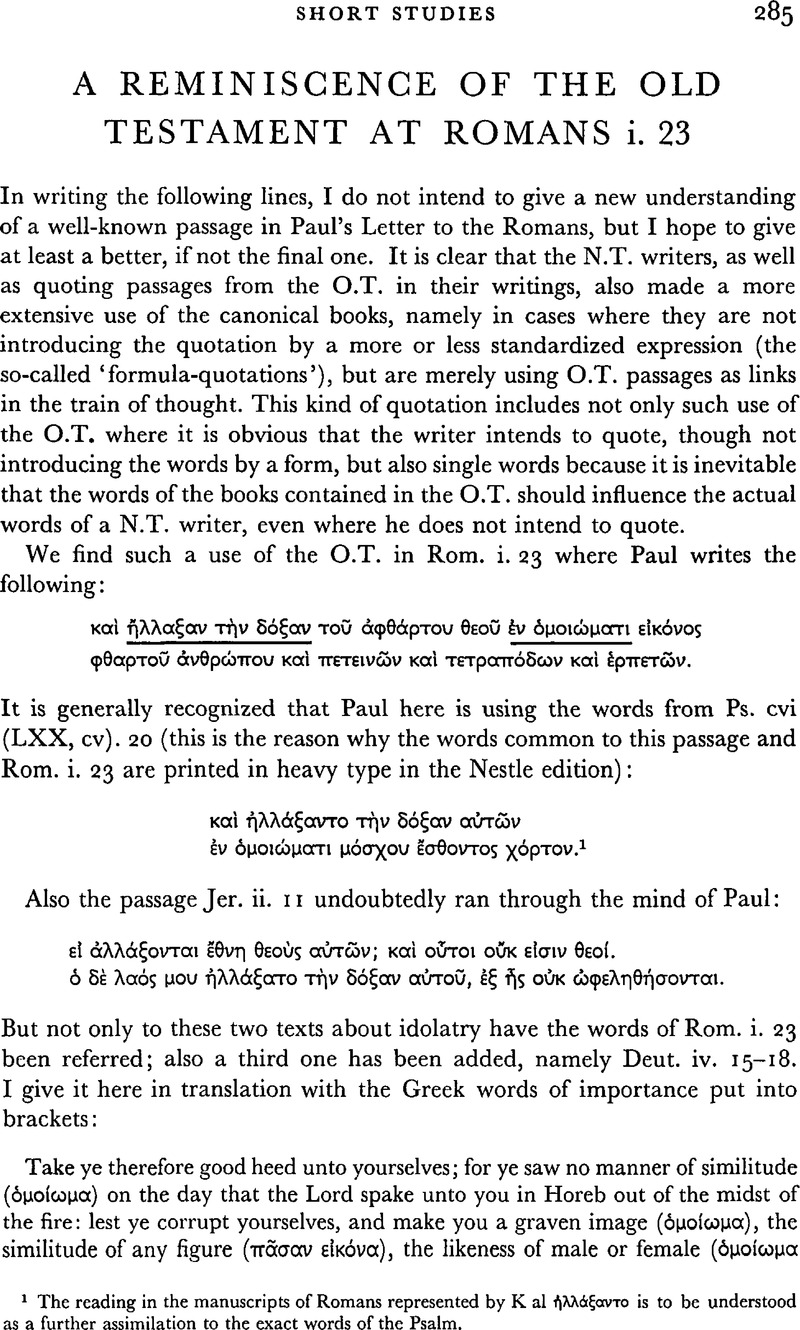Article contents
A Reminiscence of the Old Testament at Romans i. 23
Published online by Cambridge University Press: 05 February 2009
Abstract

- Type
- Short Studies
- Information
- Copyright
- Copyright © Cambridge University Press 1956
References
page 285 note 1 The reading in the manuscripts of Romans represented by K al ![]() is to be understood as a further assimilation to the exact words of the Psalm.
is to be understood as a further assimilation to the exact words of the Psalm.
page 286 note 1 See Rom. i. 26ff.
page 286 note 2 I must admit that it is only to the best of my knowledge that nobody before me has drawn this fourth quotation into discussion; but so far as the literature available to me has been consulted I have found no reference to the O.T. text here in question.
page 286 note 3 See Rom. i. 26ff.
page 287 note 1 In the text of Rom. i. 23 the creeping things will be understood mainly as crocodiles. It is a question how far Paul has considered the crocodile as a water animal; but perhaps it is not without significance that the only place in the LXX text of the O.T. where the crocodile is mentioned, Lev. xi. 29, has added an adjective to the noun, ![]() ‘the crocodile which lives on the dry land’; here, however, a crocodile in the common sense of the word is certainly not meant. On the other hand, the Hebrew word
‘the crocodile which lives on the dry land’; here, however, a crocodile in the common sense of the word is certainly not meant. On the other hand, the Hebrew word ![]() , which elsewhere means a mythological beast of some kind, is in Job xl. 25 used for the crocodile; no other word in Hebrew is used to signify this animal; the description in Job xl. 25 ff., however, is not clear and gives at any rate not the impression that a water animal is meant.
, which elsewhere means a mythological beast of some kind, is in Job xl. 25 used for the crocodile; no other word in Hebrew is used to signify this animal; the description in Job xl. 25 ff., however, is not clear and gives at any rate not the impression that a water animal is meant.
page 287 note 2 It is interesting to see the paraphrase which Lietzmann gives, An die Römer, Handbuch zum N.T., ad loc.
page 287 note 3 Rom. i. 23 is not the only place where ![]() and
and ![]() are confused; so we have in Ezek. viii. 10 (almost all manuscripts, except Cod. Vat.): ‘So I went in and I saw; and behold every form of creeping thing and beast (
are confused; so we have in Ezek. viii. 10 (almost all manuscripts, except Cod. Vat.): ‘So I went in and I saw; and behold every form of creeping thing and beast (![]() ), and all the idols of the house of Israel, pourtrayed upon it round about.’ A fine illustration of our text!
), and all the idols of the house of Israel, pourtrayed upon it round about.’ A fine illustration of our text!
page 288 note 1 If it could be proved that the δóξα of God signifies not only the Glory of God but also in a way the God-likeness of man, which he has lost, then we would have a reference in ![]()
![]() to Gen. i. 27
to Gen. i. 27 ![]() ; this would represent the Jewish view where God-likeness is an ethical problem, but not the Greek view where the problem is a philosophical and metaphysical one; see T.W.N.T. II, p. 391–3. This point being uncertain, I should not like to stress this possibility. On the other hand, the Glory of God,
; this would represent the Jewish view where God-likeness is an ethical problem, but not the Greek view where the problem is a philosophical and metaphysical one; see T.W.N.T. II, p. 391–3. This point being uncertain, I should not like to stress this possibility. On the other hand, the Glory of God, ![]() (see expecially Ps. viii, where we have thoughts of the same kind as in Gen. i. 26, and where the kabod of man is mentioned, together with dominion over the creature) was in rabbinic Judaism meant to have been lost by the fall (see Bereshit rabba II to Gen. ii. 3; also Apoc. Mos. 20 ff.). These thoughts accord with Rom. iii. 23 and correspond to the hope held among others by the N.T. that in the last days the righteous will again attain the Glory of God (Rom. viii. 18, 21).
(see expecially Ps. viii, where we have thoughts of the same kind as in Gen. i. 26, and where the kabod of man is mentioned, together with dominion over the creature) was in rabbinic Judaism meant to have been lost by the fall (see Bereshit rabba II to Gen. ii. 3; also Apoc. Mos. 20 ff.). These thoughts accord with Rom. iii. 23 and correspond to the hope held among others by the N.T. that in the last days the righteous will again attain the Glory of God (Rom. viii. 18, 21).
- 1
- Cited by




